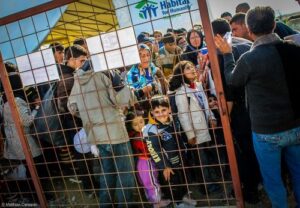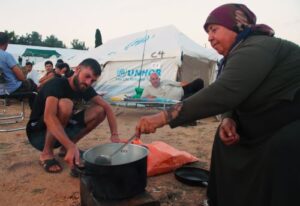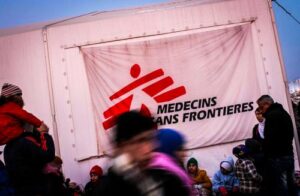Text and photos by Matthias Canapini* – Unimondo**
This second episode begins in Gevgelija, a Macedonian town bordering Greece, and ends in the port of Patras before heading to Italy (read the first one)
In November 2015, the year of the great exodus, a small business quickly sprung up in Gevgelija: Macedonian taxi drivers offered a car for 25 euros per person to all migrants and refugees who wanted to go to Skopje. Behind this shabby metal gate, hundreds of people crowded in, and fathers, at the end of their tether, punched each other to get through. I remember it like a picture painted in sweat. Father Dimitri Tasev, a Catholic priest of the Byzantine order and chaplain of the local Catholic Church, is the only one who has stayed in place since then. “I have been working in the Gevgelija refugee camp since 2015. I never went there to preach the Gospel, but to give bread and brotherhood. There is no difference between us and them. You have to be among the people to understand that. Three years ago, on the night of the visit of Pietro Parolin (a Catholic cardinal and archbishop, Secretary of State of His Holiness since 2013), three boys drowned trying to cross the river. We’ve heard terrible stories, but I don’t think we’ll see a repeat of such a flood, such a stampede. At least not as long as Europe keeps throwing money at Turkey for a violent but fictitious administration.”

Thirteen people are currently bivouacked in Gevgelija, less than fifty in Tabanovce. In the shade of a pavilion, I exchange a few words with Slobodan, a Red Cross worker. “This camp has changed completely compared to three years ago. There are very few people passing through and I predict that we will soon be forced to close. Syrians, Iranians, Bangladeshis, everyone or almost everyone is going to Greece or coming back. In Thessaloniki or Athens, it is easier to get a false document and take the new route that is opening up, through Albania, Montenegro and Bosnia. Even though we provide cots and food, people who pass through here now stay for two days at most and then leave. Ninety per cent of them, however, come from Iran: several thousand Iranian citizens, who officially came to Serbia as tourists, probably following the agreement between the two countries on the abolition of the visa requirement, arrived in the country to reach Western Europe; when they failed to do so within the thirty days allowed by the residence permit, they automatically became migrants. So many have passed through here illegally, just to get a shred of a document”. The shed, where lonely families and men crowded together, is reduced to a rusting skeleton, beaten down by the sun.
The Thermaic Gulf surrounds Thessaloniki in an embrace of bays and reefs. “Many of us want to get to Athens. It’s the capital and life in the suburbs is cheap and full of traffickers, cogs in the system,” says an anonymous witness. The traffickers work closely with the hackers who create fake passports or identity cards on the virtual black market. It is easier to send old people to Europe: the guards ask fewer questions when an old person is involved. Someone else gets into debt and sends their child (on average five, eight or thirteen years old) to Europe, to a family who will take him or her in for a fee until the child is ready to apply for family reunification. This can take two months, sometimes two years, but you wait anyway. If you apply for reunification, you can hope that the removal process will be shorter. It is still a certainty, even if the interview with the Commission goes badly. Another option, which has also become the only way to flee legally from the islands of Samos, Chios or Lesbos, is to obtain vulnerable status. It has become a general madness. Everyone in the camps is now talking about it. But before you can get in touch with the commission, you have to prove that you are mentally unstable, suicidal or pregnant.
Of course, corruption is rife here too. If you have enough money, you can always pay an outside doctor to certify that you have mental problems… At this point, at least the geographical restriction is overcome; you board a ship and are assigned to a camp on land. The paradox is that, in reality, there is nothing to recover from, after a few weeks in a camp like Moria, you go mad. A year ago I went to Lesbos. 45 people on board, 17 dead and missing. To stay afloat, I clung to a friend’s life jacket. The island and the harsh winter claimed more victims”. A series of videos taken by the man on his mobile phone show a white expanse of frozen tents, freezing children, blown up electrical panels, and pipes petrified by frost. “We were 5,000 irregular migrants in Moria. If we can’t go to Europe, at least let us go back. At home we could die from a bomb, here we die from being passive”. Meanwhile, the Greek crisis is revealing a civilised underbelly of rubbish, of fleeing construction companies, of unfinished infrastructure turned into night shelters by hundreds of illegal people.
Full beard, greenish eyes, culinary awards in half of Europe: this is the profile of Ehran, a Michelin-starred chef of Kurdish origin who has spent thirty-six years in Turkey running a luxury restaurant in Istanbul’s historic Sultanahmet district. “The reviews on Trip Advisor were great, the flow of tourists did not diminish, and trips to Italy, France and Sweden were annual. But after the elections, Erdogan’s overlords came looking for me. As well as cooking, I write, and what I wrote was uncomfortable for the regime. They offered me 20,000 euros for the restaurant on the condition that I leave Turkey immediately. They kept my name, and my famous restaurant, and forced me to flee. I don’t understand how this could happen. I had a nice house and a nice job. Now I sleep in parks and take pills to control my anxiety. A lawyer is helping me and maybe soon I will get a measly residence permit to stay here in Greece for three years. The air in Turkey is bad. Thousands of people are being arrested and thrown into prison without trial: intellectuals, politicians, doctors? and cooks.” He concludes.
I joined the volunteers of the association Stay Human, founded in 2016 by Musli Alievski. The litanies of the flute lead us to one of the worst camps in the whole of Greece, that of Vagiochori, located on a by-pass that links Thessaloniki to Kavala. Sprawled across a scorching plateau a few kilometres from the first inhabited village (ten small brick houses overlooking Lake Volvi), this transit camp is characterised by essential elements: buzzing insects, white UNCHR tents, and the IOM office separated by a metal bench. Vigilantes and the doctor traipse around the offices, and the propeller of the stationary air conditioning blows hot air outside. An oil drum cut in half and filled with pine cones, dry branches and a handful of pine needles serves as a stove. Hassan’s mother, 27, is boiling a tin of coffee. “Everything goes wrong in this camp. I had to wait twenty days to get a bottle of shampoo. There are no supermarkets nearby, and the UNHCR is nowhere to be seen. The plastic tents are flammable, and a badly managed campfire has burned the shelters to the ground. I visited several camps in the area: Schisto, Kavalari, and Diavata. In the Alexandreia camp, my son died a month ago. He was born prematurely and the conditions in the camp weakened him; he contracted a skin infection and was taken to hospital with high fever and convulsions. Since then, I no longer believe in any humanitarian organisation”.

The Kurds I meet, almost all from Afrin, are fleeing the Turkish bombs that started raining down in the spring. Baran, 23, praises the YPG (People’s Defence Units) and demonises the Russians, the Turks, the Americans and the Peshmerga. “In March, the city of Afrin was surrounded by Ankara’s troops, leaving only one humanitarian corridor open. Inside that corridor, we poured 150,000 people, all civilians. To reach Vagiochori, we crossed the Evros river, between Bulgaria and Turkey, in whose waters hundreds of men and women drowned. On 20 January 2018, the Turkish armed forces launched a military operation in the Kurdish-majority canton of Afrin, codenamed Olive Branch. In addition to targeting the Democratic Union Party, the YPG and the Syrian Democratic Forces, Turkish forces claimed to be fighting ISIS, even though there are no black militias in the region. Our homes have become puzzle pieces for the geopolitical strategies of the West. Turkey says we Kurds are all terrorists, but hold out your hand and look at your fingers. Each one is different from the other, isn’t it? How can you say that all members of a people are the same? How can you say we are all terrorists and bomb us?”
Two little sisters whimper and get their feet dirty in the reddish earth: they are the daughters of Mohamid, 33, and Lavin, 21, who smile at them from under the pine trees. “Some time ago I made friends with a Georgian family. They gave me clothes, they live two streets behind the camp. My wife is a very good cook; her speciality is parda pilaf, a typical Kurdish dish of rice, vegetables and chicken. Where can she cook here? We have nothing, only the boredom of the same old days. In the camp, we all have toothaches, infections, diarrhoea, and gastroenteritis, but the doctors rarely come and if it weren’t for the doctors from some humanitarian association, we would all be seriously ill. They say that the Vagiochori camp will be closed in October…” It was only when Mohammed stood up that we noticed his limp and the crutch he used for support. With a few gestures, and mostly thanks to Google Translator, he tells us that his brother shot him three times between the thigh and the hip. My family, fundamentalists to the bone, forced Lavin to wear the veil, while I was against it. After the incident, we decided to flee and on the same day my father-in-law, a Peshmerga officer, lost his life: an ISIS suicide bomber crashed into his post. With all this pain inside us, how can we survive?” We groped in an arena of stinking gutters. Shopping bags smash against the sharp nets of the perimeter fence and get caught in the barbed wire that never goes out of fashion. They are part of the landscape, like complaints, like burnt grass.

Backpackers, coke cans, wasps, gipsies, tramps, dates, drug addicts, Pigeon Square, drug dealing, mattresses, sex tourism, Open Moria Camp. Patras is one of the main hubs for migrants on the move, the port where everything comes together. It is a city populated by illegal immigrants and refugees waiting for the great leap, to board a lorry on their way to Europe. Tens of thousands of people live huddled around the edges of the port, in abandoned factories or car dealerships, asbestos sheets, and cardboard walls. Everyone trembles, everyone tells the stories of those who have made it. Everyone understands without words. It is less than three hundred metres from the Arabic inscriptions on the chimneys to the departing ships. In between, two paved roads, a metal gate, and a fence to cross. Three hunched silhouettes sneak out of a bush, cross the road quickly and lie down against the wall. They have no rucksacks or handbags, just a tank top and a pair of sandals welded together with wire and string. All three of them hurried to hide their fear, trying to breathe in a chorus, a liturgy. The first, sensing the reason for my clumsy approach, waves off a more than valid reason: “I can’t talk now! I’ve got a lot to do, I’m trying to get to France,” he says, before jumping over the barrier and running at breakneck speed towards the quay. The second one, drenched in sweat, bites his nails and waits, waits, waits until the first one is chased, beaten up, and pushed out of the port fortress. He came back with his tail between his legs, slipping through a red door that was open in solidarity with all the refugees in Greece.
The third comrade stopped. His name is Ahmed and he never made it through the Greek funnel. It didn’t even help him to improve his throwing technique. “Until recently, anyone could jump on a ferry and reach Italy without paying. Now it’s impossible, and not just because of the capillary checks by the police. Even if you hide under a lorry, you still have to pay a fee, and often it is the drivers themselves who demand it. You don’t calculate how much the trip will cost before you set off, but money is important. I spent at least 10,000 euros to get from Afghanistan to Europe,” says Ahmed, as the security guard points to batteries and spotlights in the trunks of the lorries lined up for the Brindisi-Ancona route. The young riffraff remains in the cordon of the roof. They point, they gesticulate, they curse. They wait in single file for the evening ferry to leave.
* Matthias Canapini was born in Fano, central Italy, in 1992. He travels at a slow pace to tell stories with his notebook and camera. He has published five books since 2015 and is currently a news editor and reporter for the news outlet Unimondo.
** Unimondo, founded on 10 December 1998 under the auspices of the Fontana Onlus Foundation, is an online news outlet dedicated to providing authoritative content on peace, sustainable human development, human rights and environmental issues. It offers diverse and timely information, amplifying the voices of different facets of Italian and global civil society. As the Italian hub of the OneWorld network, founded in London in 1995, it is part of a global network with 11 centres worldwide and 1,600 partner associations.
























